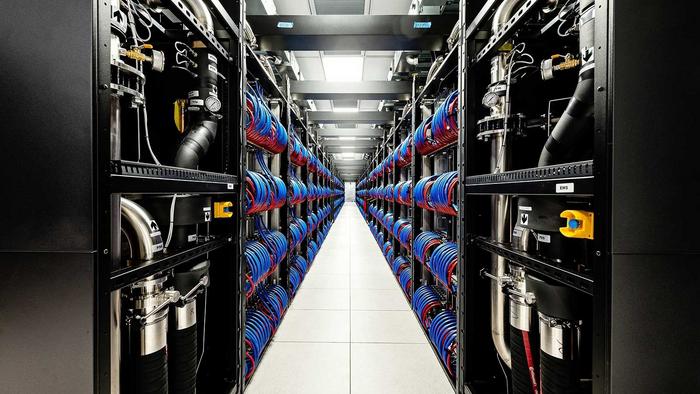The U.S. Department of Energy’s (DOE) Innovative and Novel Computational Impact on Theory and Experiment (INCITE) program is now accepting proposals for high-impact, computationally intensive research projects in a broad array of science, engineering and computer science domains. Proposals must be submitted between April 10 and June 14.

Credit: (Image by Argonne National Laboratory.)
The U.S. Department of Energy’s (DOE) Innovative and Novel Computational Impact on Theory and Experiment (INCITE) program is now accepting proposals for high-impact, computationally intensive research projects in a broad array of science, engineering and computer science domains. Proposals must be submitted between April 10 and June 14.
The INCITE program aims to accelerate scientific discoveries and technological innovations by awarding researchers with substantial allocations of supercomputer time and supporting resources at the Argonne Leadership Computing Facility (ALCF) and the Oak Ridge Leadership Computing Facility (OLCF). The ALCF and OLCF are DOE Office of Science user facilities located at DOE’s Argonne National Laboratory and Oak Ridge National Laboratory, respectively.
“INCITE is the flagship program for leadership computing. Every year, there is real excitement to see the impactful and challenging science projects that researchers are trying to tackle,” said Katherine Riley, ALCF director of science. “As we move fully into the era of exascale computing, I look forward to fantastic proposals.”
Open to researchers around the world from academia, industry and government agencies, the INCITE program will award up to 60% of the allocable time on DOE’s leadership-class supercomputers: the OLCF’s Frontier, a 1.2 exaflops HPE Cray EX machine; ALCF’s Polaris, a 34 petaflops (44 petaflops of Tensor Core FP64 performance) HPE Cray machine; and Aurora, an Intel-HPE Cray EX system with a theoretical peak performance of more than 2 exaflops. Proposals may request project durations from one to three years.
“I’m excited to see how investigators from a variety of scientific disciplines are thinking about using our world-leading and globally unique computational resources and expertise through the INCITE program,” said ORNL’s Bronson Messer, OLCF’s director of science. “Pushing the frontiers of discovery in every scientific domain is a hallmark of leadership computing and INCITE lies firmly at the heart of that enterprise.”
In addition to seeking traditional simulation-based projects, the call for proposals is open to projects involving applications in data science, such as data-intensive computing and machine learning, and projects with complicated workflows. Furthermore, crosscutting proposals that integrate simulation, data and learning methods are encouraged.
Every proposal undergoes a peer-review process aimed at pinpointing projects with the highest potential for impact and a clear need for leadership-class systems to tackle significant challenges. Applications are also assessed for computational readiness to gauge how efficiently the proposed projects will use the requested systems.
INCITE is once again committing 10% of allocable time to an Early Career Track in 2025. Since 2022, the program has sought to encourage the next generation of high performance computing researchers by focusing on principal investigators (PI) who have earned a doctorate degree within the last 10 years. Researchers who earned their Ph.D. on or after Dec. 31, 2014, and who have not served as PI on a previous INCITE project are eligible. Applicants’ project proposals will go through the regular INCITE Technical Assessment (previously called Computational Readiness) and Peer Review process, but the INCITE management committee will consider meritorious projects in the Early Career Track separately.
To submit a proposal or read additional details about the requirements, visit https://www.doeleadershipcomputing.org/call-for-proposals/. Proposals will be accepted until 8 p.m. ET on Friday, June 14. Awards are expected to be announced in November.
For more information on the INCITE program and a list of previous awards, visit www.doeleadershipcomputing.org.
Preparing for INCITE
The INCITE program will host informational webinars on April 23 and May 7. Registration links will be posted here when available: https://doeleadershipcomputing.org/informational-webinars/.
The Argonne Leadership Computing Facility provides supercomputing capabilities to the scientific and engineering community to advance fundamental discovery and understanding in a broad range of disciplines. Supported by the U.S. Department of Energy’s (DOE’s) Office of Science, Advanced Scientific Computing Research (ASCR) program, the ALCF is one of two DOE Leadership Computing Facilities in the nation dedicated to open science.
Argonne National Laboratory seeks solutions to pressing national problems in science and technology. The nation’s first national laboratory, Argonne conducts leading-edge basic and applied scientific research in virtually every scientific discipline. Argonne researchers work closely with researchers from hundreds of companies, universities, and federal, state and municipal agencies to help them solve their specific problems, advance America’s scientific leadership and prepare the nation for a better future. With employees from more than 60 nations, Argonne is managed by UChicago Argonne, LLC for the U.S. Department of Energy’s Office of Science.
The U.S. Department of Energy’s Office of Science is the single largest supporter of basic research in the physical sciences in the United States and is working to address some of the most pressing challenges of our time. For more information, visit https://energy.gov/science.
Discover more from Science
Subscribe to get the latest posts sent to your email.


